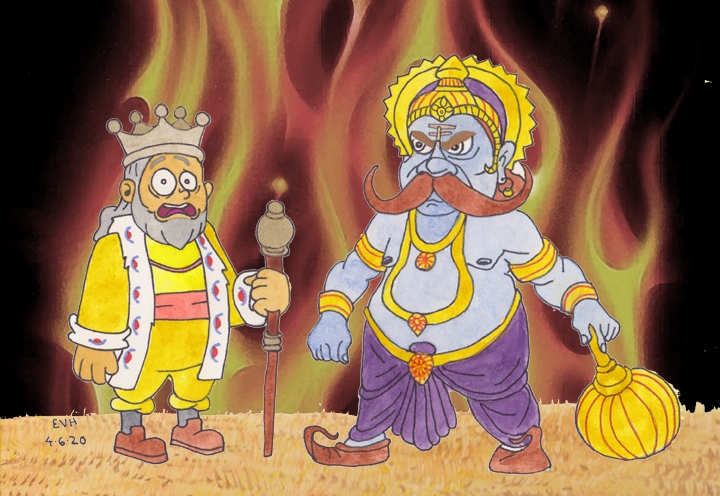
Jataka 240
Mahāpiṇgala Jātaka
The Great Yellow King
as told by Eric Van Horn
originally translated by William Henry Denham Rouse, Cambridge University
originally edited by Professor Edward Byles Cowell, Cambridge University
Ajahn Brahmali often points out that people who are cruel will be dealt with in due time by the relentless forces of karma. So even if people treat us with cruelty, we can let their bad behavior pass us by. Our job is to develop good qualities, to be kind, generous, compassionate, and loving.
“The Yellow King.” The Master told this story at the Jetavana Park. It is about the dissident Devadatta.
For nine months Devadatta tried to destroy the future Buddha, and as a result had sunk down into the earth by the gateway of Jetavana. (According to Jātaka 457 Devadatta was “swallowed up by the earth,” possibly an earthquake.)
Then those who lived at Jetavana and the country around there were delighted, saying, “Devadatta, the enemy of Buddha, has been swallowed up in the earth. The adversary is dead, and the Master has become perfectly enlightened!” And hearing these words spoken over and over again, the people of the entire continent of India and all the goblins and living creatures and gods were equally delighted.
One day, all the monks were talking together in the Dharma Hall. They were saying, “Brother, since Devadatta sank into the earth, what a great number of people are glad, saying, ‘Devadatta is swallowed up by the earth!’” The Teacher entered and asked, “What are you all discussing here, monks?” They told him. Then said he, “This is not the first time, oh monks, that a great number of people have rejoiced and laughed aloud at the death of Devadatta. Long ago they rejoiced and laughed as they do now.” And he told them this story from the past.
Once upon a time there was a wicked and unjust King named Mahāpiṇgala, the Great Yellow King. He ruled over Benares. He behaved wickedly for his own will and pleasure. With taxes and fines and many mutilations and robberies, he crushed the people as if they were sugar cane in a mill. He was cruel, fierce, and ferocious. He did not have a grain of compassion. At home he was harsh and unforgiving to his wives, his sons, his daughters, his brahmin courtiers, and the householders of the country. He was like a speck of dust that falls in the eye, like gravel in the broth, like a thorn sticking in the heel.
Now the Bodhisatta was a son of King Mahāpiṇgala. After this King had reigned for a long time, he died. And when he died all of the citizens of Benares were overjoyed. They laughed a great laugh. They burned his body with a thousand cartloads of logs and doused the cremation site with thousands of jars of water. Then they consecrated the Bodhisatta to be the King. They beat a drum of rejoicing around the streets for the joy that they had gotten a righteous king. They raised flags and banners and decked out the city. At every door there was a pavilion. They scattered parched corn and flowers. They sat down on decorated platforms under fine canopies and ate and drank. The Bodhisatta himself sat upon a fine couch on a great raised platform in great magnificence, with a white parasol stretched above him. The courtiers and householders, the citizens and the doorkeepers stood around their King.
But there was one doorkeeper who was standing not far from the King. He was sighing and sobbing. “Good Porter,” the Bodhisatta said, “all of the people are making merry for joy that my father is dead, but you stand weeping. Come, was my father good and kind to you?” And with the question he uttered the first stanza:
“The Yellow King was cruel to all men.
Now he is dead; all freely breathe again.
Was he, the yellow-eyed, so very dear?
Or, Porter, why do you stand weeping here?”
The man heard this, and he answered: “I am not weeping for sorrow that Piṅgala is dead. My head would be glad enough. For King Piṅgala, every time he came down from the palace or went up into it, would give me eight blows over the head with his fist, fierce like the blows of a blacksmith’s hammer. So when he goes down to the other world, he will deal eight blows on the head of Yama, the gatekeeper of hell, as though he were striking me. Then the people there will cry, ‘He is too cruel for us! And they will send him back up again. And I fear he will come and deal blows to my head again, and that is why I weep.” To explain further he uttered the second stanza:
“The Yellow King was anything but dear,
It is his coming back again I fear.
What if he beat the King of Death, and then
The King of Death should send him back again?”
Then the Bodhisatta said, “That King has been burned with a thousand cartloads of wood. The place of his burning has been soaked with water from thousands of pitchers. The ground has been dug up all around. Beings that have gone to the other world do not return to the same bodily shape as they had before. Do not be afraid!” And to comfort him, he repeated the following stanza:
“Thousands of loads of wood have burned him quite,
Thousands of pitchers quenched what still did burn,
The earth is dug about to left and right
Fear not, the King will never more return.

Figure: “Hi. I’m Yama. Welcome to hell.”
The porter took comfort after that. From then on the Bodhisatta ruled in righteousness. And after giving gifts and doing other kind acts, he passed away to fare according to his karma.
When the Master ended this discourse, he identified the birth: “Devadatta was Piṅgala, and I was his son.”
